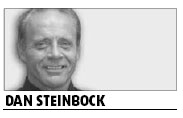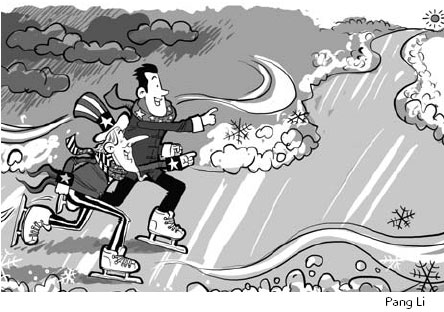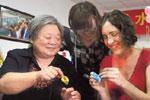Dan Steinbock
Mutual trust can ride over challenges
Updated: 2009-07-30 07:49
By Dan Steinbock (China Daily)

At the opening of the US-China Strategic and Economic Dialogue (SAED), US President Barack Obama said:"No one nation can meet the challenges of the 21st century on its own, nor effectively advance its interests in isolation. It is this fundamental truth that compels us to cooperate."
The remarks set a new tone of cooperation for the first round of the US-Chinese dialogue in Washington. It is the economic challenges ahead that will test it.
It's a different world now. China's dramatic rise and the global crisis have highlighted the increasing interdependency of national economies.
Washington attaches great importance to the strategic and economic dialogue, which is co-chaired by US Secretary of State Hillary Clinton and Secretary of Treasury Timothy Geithner, and China's Vice-Premier Wang Qishan and State Councilor Dai Bingguo.
The importance of the expanded dialogue was also reflected in the broadened US delegation, including Federal Reserve Chairman Ben Bernanke, National Economic Council Director Lawrence Summers and Obama's budget director Peter Orszag.
Behind the limelight, the two sides got down to "very constructive, very candid" negotiations, which focused on the challenges and opportunities that both nations face on a wide array of bilateral, regional and global areas.
The first SAED round resulted in a broad framework for cooperation in four key areas. The two nations agreed to:
Undertake macroeconomic and structural policies to ensure a more sustainable and balanced trajectory of global growth;
Build more resilient and market-oriented financial and regulatory systems;
Reaffirm their commitment to open- and rules-based trade and investment; and
Recognize the critical role of the international financial institutions in preventing and responding to crisis and ensuring balanced global growth.
How meaningful are these results? The weary will answer that the devil is in the details. The hopeful will respond that never before has the dialogue been so broad, and so promising.
Now the SAED reflects more closely what Clinton has called the "most important bilateral relationship in the world in this century".
During the Bush era, the dialogue occurred amid great expectations but on a narrow agenda. In the Obama era, the dialogue has started amid more realistic expectations but a broad agenda.
Economic issues currently reign over the strategic ones. In this regard, the dialogue focused on efforts to cooperatively address the crisis and to strengthen growth. It is the first goal of the broad framework - balanced global growth - that is most critical in the short term.
Since fall last year, the US current account has fallen and private savings rates have risen to historical average levels. Now Washington has promised to take steps to reinforce these trends, while seeking to lower the fiscal deficit to sustainable levels once recovery really starts.

In turn, China will intensify its efforts to rebalance toward domestic demand-led growth and increase the share of consumption in GDP.
Both sides hope that greater development of China's services sector and the shift away from dependence on exports and heavy industry will have a powerful effect on rebalancing. They also hope that it will support the transition to a green economy.
On the Chinese side, the key concern remains the security of its assets in the US. China has more than $2.1 trillion in US dollar denominated assets, including more than $800 billion in US Treasury securities (as of May 2009).
"As a major reserve currency-issuing country in the world, the US should properly balance and properly handle the impact of the dollar supply on the domestic economy and the world economy as a whole," said Wang Qishan, cautioning against letting the dollar slide too far.
Interestingly, the US promised to make it easier for US companies to export high-technology goods to China. On the strategic side, the two parties have discussed an array of complex bilateral and multilateral issues, including the Democratic People's Republic of Korea, Iran, Pakistan and Afghanistan.
"We have laid the foundation for a positive, cooperative and comprehensive relationship for the 21st century," Clinton has said.
As part of the "strategic track" of discussions, the two countries also signed a memorandum of understanding on bilateral cooperation in energy, climate change and the environment.
For half a century, post-War victors have dominated international financial institutions. Such arrangements no longer reflect the balance of power in the 21st century.
Henry Kissinger, former US secretary of state, has praised Obama's opening foreign policy moves. Under Obama, the White House has returned to traditional US multilateralism of treaties, alliances and grand strategy.
But it is the economy that made the Obama presidency. Though an overwhelming majority of Americans stand behind the White House's foreign policy, the story is very different with domestic policy.
Obama's initiatives - health reform, alternative energy, moderate regulatory reforms, and the languishing effort to buy off the "toxic assets" of the banking system - have sparked uncertainty and dissension.
The success of the US-China dialogue depends on outcome of US domestic policy, too, because the latter is vital for sustained economic recovery.
Since fall last year, the US and China both have enacted massive stimulus programs. Now they must decide how and when to phase them out without damage to their respective economies.
Both see inflation as a major threat. China is especially worried by potential US efforts to "inflate" its way out of the fiscal deficit.
In the coming months, the progress of the dialogue will depend on the anticipated recovery of the US economy, which seems to be bottoming out. While the real GDP is no longer plunging, the decline of the last quarter is still estimated at 1 to 2 percent.
US consumer confidence is now declining. In the third quarter, lingering growth is not expected to generate enough jobs to reverse the rate of unemployment.
There is also concern over whether the anticipated recovery will be sustainable after the effect of the stimulus package wears off. Still, there is a new tone of cooperation in the US-Chinese dialogue.
It is the economic challenges ahead that will test the SAED. And it is the shared US-Chinese trust that can support efforts to overcome those challenges.
The author is the research director of International Business at the India, China and America Institute
(China Daily 07/30/2009 page9)
Specials

China dream
Popular Bluff, Missouri, native Catherine Beck never imagined her summer experiences in China would change her career course.